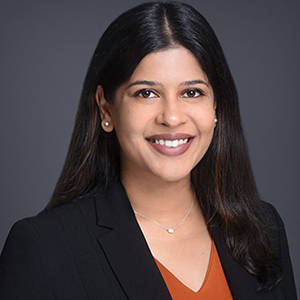One Woman, One Dream, Many Guiding Beacons

A long-cherished dream of mine came to fruition last November: I matched at the University of Minnesota for cardiology fellowship. My experiential journey that led to this fellowship match started with my MBBS training in India, followed by residency in a New York City program and was enriched by the contributions of incredible physicians.
I first got drawn to cardiology during my stint as a visiting medical student at the Mayo Clinic, Rochester. Observing my keen interest, my supervising fellow, Siu-Hin Wan, MD, FACC, encouraged me to author my first case report and present it at an international conference in Boston. A few months later, I matched as an internal medicine resident at the Albert Einstein College of Medicine.
Intern year proved to be a whirlwind of transition. By the middle of the second year, amidst the rising clinical demands of residency, discussions on fellowship applications resonated in the hospital corridors. I watched my more experienced colleagues agonize endlessly over recommendation letters and program lists, and as the youngest member of my class, occasionally even second-guessed my decision to apply. The match was daunting for an international medical graduate on a restrictive visa and even more so for a female applicant.
I voiced my concerns to my mentor Rosy Thachil, MD, FACC, and her belief in me pushed me to explore new research topics. We conducted a study on gender disparity in the authorship of cardiology guidelines, which we presented as a poster at ACC.22. The project emphasized the need for cultivating strong role models among women as clinical cardiologists and academicians. At this juncture, I was also accepted into the ACC Internal Medicine Cardiology program to be part of the inaugural cohort of women.
This pipeline program for diverse residents kicked off with a series of webinars covering relevant subjects like work-life balance, a concern among women who plan to pursue cardiology. It was heartening to hear from leaders like Martha Gulati, MD, MS, FACC, and Toniya Singh, MBBS, FACC, whose addresses embodied humility and compassion. The motivating journeys and experiences of current fellows instilled a sense of belonging and made us confident about achieving our goals. We also attended a beneficial session on tips for curating our application, with insights from a panel of program directors. The lecture on mentor-mentee relationships inspired me to participate in collaborative research under Kyle W. Klarich, MD, FACC, who strongly supported my application. Further, our project on sudden cardiac death in infiltrative cardiomyopathies piqued my interest in cardiorheumatology as a field I wish to explore ahead. Through this program, I also met a fantastic community of residents who shared my fears, hopes and dreams. I am indebted to Quinn Capers IV, MD, FACC; Melanie S. Sulistio, MD, FACC, and Mayra E. Guerrero, MD, FACC, the team behind this powerful internal medicine initiative; and to Ms. Maghee Disch and Mr. Ryan Meyer, our biggest cheerleaders.
Eventually, I applied to 56 programs compliant with my visa type and ended up with a sizable number of interviews. Kiran Mahmood, MD, FACC, my mentor through the ACC Internal Medicine Cardiology program, conducted a mock interview that put me in good stead during my actual ones. Additionally, when I was conflicted while finalizing my rank list, mentors like Mario J. Garcia, MD, FACC, provided honest, unbiased opinions of programs and advocated for me. When you believe in a dream, the world conspires to make it come true. My Match Day was well worth the nervous wait!

This article was authored by Sneha Nandy, MD, a cardiology fellow at the University of Minnesota.
Twitter: @snehanandy26
This content was developed independently from the content developed for ACC.org. This content was not reviewed by the American College of Cardiology (ACC) for medical accuracy and the content is provided on an "as is" basis. Inclusion on ACC.org does not constitute a guarantee or endorsement by the ACC and ACC makes no warranty that the content is accurate, complete or error-free. The content is not a substitute for personalized medical advice and is not intended to be used as the sole basis for making individualized medical or health-related decisions. Statements or opinions expressed in this content reflect the views of the authors and do not reflect the official policy of ACC.

